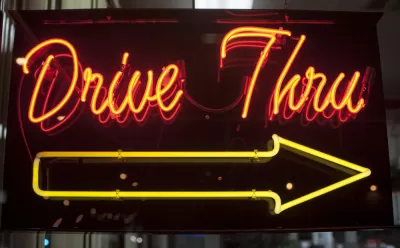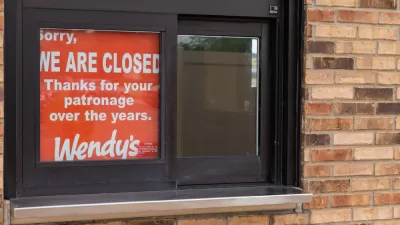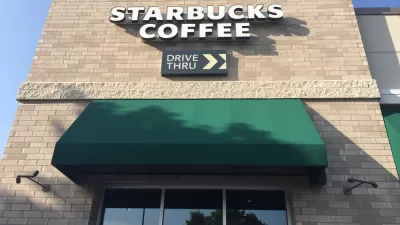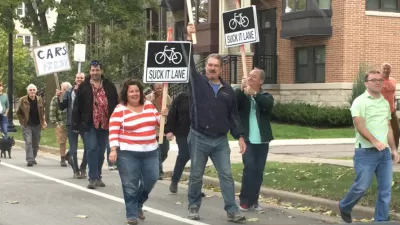A proposal in Minneapolis would restrict the development of drive-throughs, in pedestrian-friendly parts of the city, as a safety measure for all non-car users of the street.

This week saw a stream of coverage for a brewing controversy in Minneapolis over a proposed expansion of Pedestrian Oriented Overlay Districts in the city. Eric Roper breaks the news: "some Minneapolis leaders want to clamp down on drive-throughs in favor of people traveling the city on foot. A change to city rules in its early stages would likely further restrict where drive-throughs could be installed in the city." The article provides in-depth news coverage of the proposed changes, including opinions from the public and details about past decisions that implemented similar restrictions in other parts of the city.
Then came an editorial from the Minneapolis Star Tribune, voicing opposition to the proposal. The first salvo in the editorial invokes a dreaded standby: "The engineered society is a fantasy that dies hard for some." The editorial goes on to make the case that the convenience of drive-throughs is a necessity for some, and that additional restrictions on drive-throughs would be more burdensome than beneficial.
The editorial and the comment board on the original news article inspired Alex Cecchini to write a counterpoint, which provides more specific details about the proposed expansion of the Pedestrian Overlay Districts, along with evidence from "transportation safety research that resoundingly says that commercial driveway frequency and vehicle volume are correlated with higher pedestrian collisions." The post goes on to provide a detailed response to the arguments of the editorial board, along with pointing out what the paper's argument's missed.
Finally, the national media got a hold of the story. Emily Badger at The Washington Post's Wonkblog describes the drive-through as "the ultimate symbol of how we've built into the world around us the deeply held belief that you should be able to do everything you want, as conveniently as possible, by automobile." That Minneapolis is even considering an expansion of its Pedestrian Overlay Districts, it's "a sign it may be ready to reconsider that more deeply entrenched idea..."
Aarian Marshall, writing for CityLab, pulled out some big guns to shoot down the arguments of the Star Tribune's editorial board, by calling on Eric Dumbaugh, a traffic safety expert and associate professor at Florida Atlantic University’s School of Urban and Regional Planning, and citing studies by the Minnesota Department of Transportation. Marshall also acknowledges the difficulty in this debate, as with so many others, that cause editorial boards to cry social engineering: "Of course, taking that 'extra measure of comfort' away from drivers is easier said than done. This is the central tension that lies in most planning, isn’t it?"
FULL STORY: Minneapolis considers driving out drive-through businesses

Maui's Vacation Rental Debate Turns Ugly
Verbal attacks, misinformation campaigns and fistfights plague a high-stakes debate to convert thousands of vacation rentals into long-term housing.

Planetizen Federal Action Tracker
A weekly monitor of how Trump’s orders and actions are impacting planners and planning in America.

In Urban Planning, AI Prompting Could be the New Design Thinking
Creativity has long been key to great urban design. What if we see AI as our new creative partner?

Pedestrian Deaths Drop, Remain Twice as High as in 2009
Fatalities declined by 4 percent in 2024, but the U.S. is still nowhere close to ‘Vision Zero.’

King County Supportive Housing Program Offers Hope for Unhoused Residents
The county is taking a ‘Housing First’ approach that prioritizes getting people into housing, then offering wraparound supportive services.

Researchers Use AI to Get Clearer Picture of US Housing
Analysts are using artificial intelligence to supercharge their research by allowing them to comb through data faster. Though these AI tools can be error prone, they save time and housing researchers are optimistic about the future.
Urban Design for Planners 1: Software Tools
This six-course series explores essential urban design concepts using open source software and equips planners with the tools they need to participate fully in the urban design process.
Planning for Universal Design
Learn the tools for implementing Universal Design in planning regulations.
planning NEXT
Appalachian Highlands Housing Partners
Mpact (founded as Rail~Volution)
City of Camden Redevelopment Agency
City of Astoria
City of Portland
City of Laramie





























